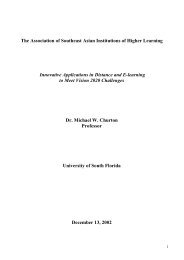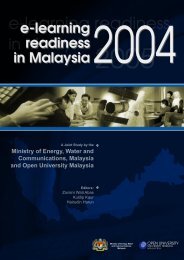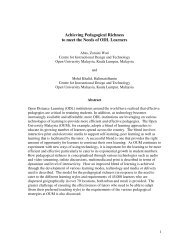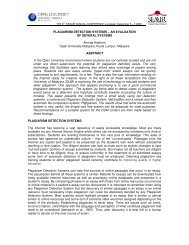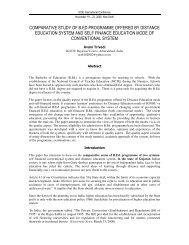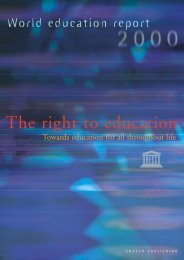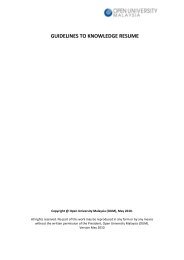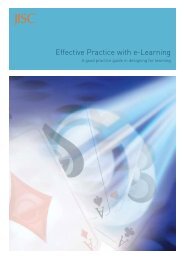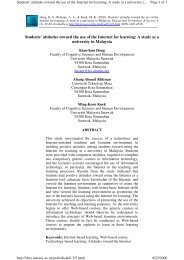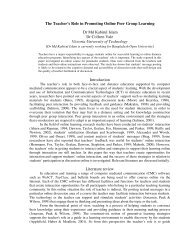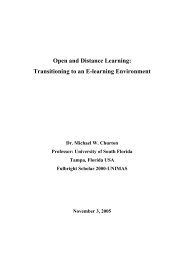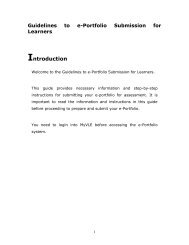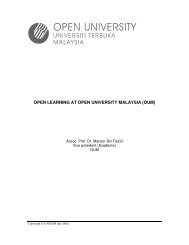lifelong learning and distance higher education - Asia Pacific Region
lifelong learning and distance higher education - Asia Pacific Region
lifelong learning and distance higher education - Asia Pacific Region
- No tags were found...
You also want an ePaper? Increase the reach of your titles
YUMPU automatically turns print PDFs into web optimized ePapers that Google loves.
RELEVANT INTERNET SITESUNESCO Task Force on Education for the Twenty-first Centurywww.unesco.org/delors/The aim of this website is to further debate <strong>and</strong> reflection on the ideas expressed in Learning:the Treasure Within, the report to UNESCO of the International Commission on Education forthe Twenty-first Century. Simply speaking, the Commission felt that <strong>education</strong> throughout life isbased upon four pillars: <strong>learning</strong> to know, <strong>learning</strong> to do, <strong>learning</strong> to live together <strong>and</strong> <strong>learning</strong> tobe.European Commission — Lifelong Learninghttp://europa.eu.int/comm/<strong>education</strong>/policies/lll/lll_en.htmlAt the Lisbon European Council in March 2000, government leaders set the EU a 10-yearmission to become the most competitive <strong>and</strong> dynamic knowledge-based economy in the world,capable of sustained economic growth with more <strong>and</strong> better jobs <strong>and</strong> greater social cohesion.Lifelong <strong>learning</strong> is a core element of this strategy, central not only to competitiveness <strong>and</strong>employability but also to social inclusion, active citizenship <strong>and</strong> personal development. Thissite provides documentation <strong>and</strong> links to further information in this area by the EuropeanCommissionOECD — Lifelong Learning <strong>and</strong> Sectors of Educationwww.oecd.org/department/0,2688,en_2649_34509_1_1_1_1_1,00.htmlLifelong <strong>learning</strong> for all is the guiding framework for OECD’s work on <strong>learning</strong>, both formal <strong>and</strong>informal. Systemic considerations include foundations; outcomes; access <strong>and</strong> equity; resources;pathways; visibility <strong>and</strong> recognition; <strong>and</strong> policy co-ordination. This site provides furtherinformation in this area by the OECD.Council of Europe – Lifelong Learning for Equity <strong>and</strong> Social Cohesionwww.coe.int/T/DG4/HigherEducation/CompletedActivities/LLLEquity_EN.aspThe project pursued political aims in a crucially important field for the future of the academiccommunity in Europe: the challenge of <strong>lifelong</strong> <strong>learning</strong>, in line with the priorities defined bythe Second Summit of Heads of State <strong>and</strong> Government of the Council of Europe in October1997, which called for a “new strategy of social cohesion” within the framework of democraticsecurity. The specific role of <strong>higher</strong> <strong>education</strong> in this strategy is to combat exclusion <strong>and</strong>marginalisation by ensuring equality of opportunity in <strong>education</strong> <strong>and</strong> meeting the new dem<strong>and</strong>sraised by society following the profound political, economic <strong>and</strong> social transformations whichhave taken place in Europe. This site provides further information in this area by the Council ofEurope.The Open University, UKwww.open.ac.uk/The Open University is open to people, places, methods <strong>and</strong> ideas. It promotes <strong>education</strong>alopportunity <strong>and</strong> social justice by providing high-quality university <strong>education</strong> to all who wishto realise their ambitions <strong>and</strong> fulfil their potential. Through academic research, pedagogicinnovation <strong>and</strong> collaborative partnership it seeks to be a world leader in the design, content <strong>and</strong>delivery of supported open <strong>and</strong> <strong>distance</strong> <strong>learning</strong>. This site provides further information on theOU <strong>and</strong> its programmes.ECTS - European Credit Transfer Systemhttp://europa.eu.int/comm/<strong>education</strong>/programmes/socrates/ects_en.htmlThe European Credit Transfer <strong>and</strong> Accumulation System is a student-centred system based onthe student workload required to achieve the objectives of a programme, objectives preferablyspecified in terms of the <strong>learning</strong> outcomes <strong>and</strong> competences to be acquired. This site providesfurther information on this topic.20



